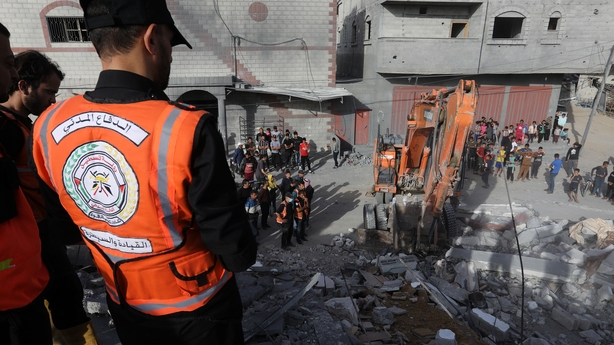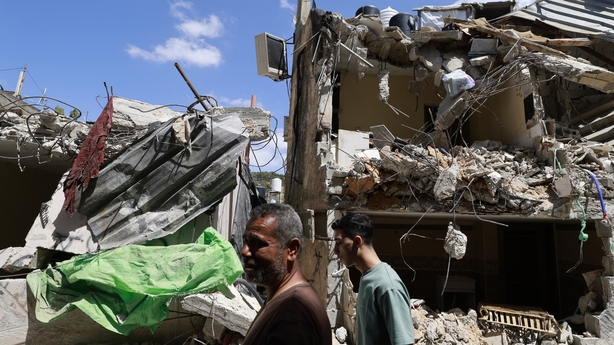The head of Israeli military intelligence, who last year accepted responsibility for the failures that allowed the Hamas-led attack on Israel on 7 October, has resigned, the military said in a statement.
Major General Aharon Haliva was one of a number of senior Israeli commanders who said they had failed to foresee and prevent the most devastating attack in Israel's history.
The 38-year-old will remain in post until a successor is named.
Israeli media and commentators expect further resignations once the main military campaign in Gaza wraps up.
"The intelligence division under my command did not live up to the task we were entrusted with. I have carried that black day with me ever since," he said in a resignation letter released by the military.
Around 1,200 Israelis and foreigners were killed in the attack, most of them civilians, and around 250 were taken into captivity in Gaza, where 133 remain as hostages.
The attack badly tarnished the reputation of the Israeli military and intelligence services, previously seen as virtually unbeatable.
The head of the armed forces, Lieutenant-General Herzi Halevi, and the head of the domestic intelligence agency Shin Bet, Ronen Bar, both accepted responsibility in the aftermath of the attack but have stayed on while the war in Gaza has continued.
Israel's prime minister Benjamin Netanyahu has so far not accepted responsibility, although surveys indicate that most Israelis blame him for failing not to do enough to prevent or defend against the attack.
At least 34,151 Palestinians have been killed and 77,084 wounded in Israel's military offensive on Gaza since 7 October, the Gaza health ministry said in its latest statement.
Meanwhile Mr Netanyahu said he would fight against sanctions being imposed on any Israeli military units for alleged rights violations, after media reports said the US was planning such a step.

The Axios news site reported on Saturday that the US was planning to impose sanctions on Israel's Netzah Yehuda battalion, which has operated in the occupied West Bank, though the Israeli military said it was not aware of any such measures.
On Friday, the US announced a series of sanctions linked to Israeli settlers in the West Bank, in the latest sign of growing US frustration with the policies of Mr Netanyahu, whose coalition government relies on settler parties.
"If anyone thinks they can impose sanctions on a unit of the IDF (Israel Defence Forces) - I will fight it with all my strength," Mr Netanyahu said in a statement.
Israeli war cabinet minister Benny Gantz, a centrist former armed forces chief, said in a statement that he spoke with US Secretary of State Antony Blinken and asked him to reconsider the matter.
The State Department said Mr Blinken spoke with Mr Gantz and Israeli defence minister Yoav Gallant about Israel's security, efforts to ensure the conflict in Gaza does not spread and the need for an immediate ceasefire with an increased flow of humanitarian aid to civilians in Gaza.
The US statements did not mention sanctions.
Read more about the conflict in the Middle East
We need your consent to load this rte-player contentWe use rte-player to manage extra content that can set cookies on your device and collect data about your activity. Please review their details and accept them to load the content.Manage Preferences
Mr Gantz said any such sanctions would be a mistake because they would harm Israel's legitimacy during a time of war and that they were unjustified because Israel has an independent justice system and a military that keeps international law.
Mr Blinken on Friday said he had made "determinations" regarding accusations that Israel violated a set of US laws that prohibit providing military assistance to individuals or security force units that commit gross violations of human rights.
Earlier this week, the ProPublica investigative news organisation reported that a special US State Department panel known as the Israel Leahy Vetting Forum had recommended months ago to Mr Blinken that multiple Israeli military and police units be disqualified from receiving US aid, after allegations of human rights violations.

On the rise
The incidents that were the subject of allegations took place in the West Bank and mostly occurred before Israel's war with Hamas in Gaza began on 7 October, the outlet said.
Before the Gaza war, violence had already been on the rise in the West Bank, land that the Palestinians seek for a state, and it has risen since with frequent Israeli raids, Palestinian street attacks and settler rampages in Palestinian villages.
The Israeli military said the Netzah Yehuda battalion is an active combat unit that operates according to the principles of international law.
"Following publications about sanctions against the battalion, the IDF is not aware of the issue," the military said.
"If a decision is made on the matter it will be reviewed. The IDF works and will continue to work to investigate an unusual event in a practical manner and according to law,"
In 2022, Netzah Yehuda's battalion commander was reprimanded and two officers were dismissed over the death of an elderly Palestinian-American whom the unit's soldiers had detained in the West Bank, an incident that stirred concern in Washington.
There have been several other incidents in recent years, some captured on video, in which Netzah Yehuda soldiers were accused of or charged with abusing Palestinian detainees.

